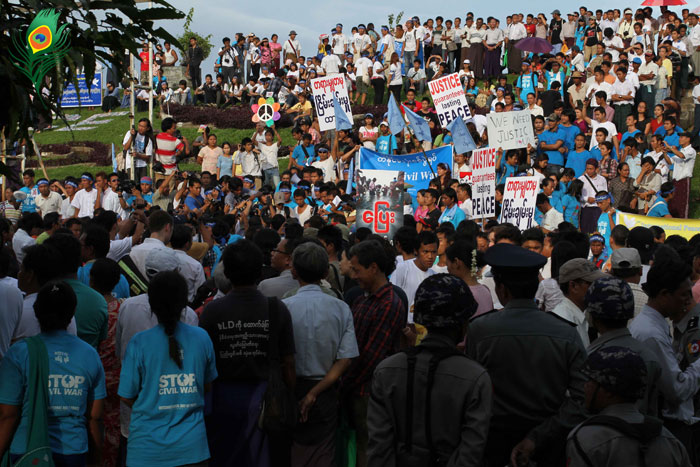The Burmese government should drop charges against activists who organized peaceful demonstrations on International Peace Day in Rangoon on September 21, Human Rights Watch (HRW) said on Monday.
 Thirteen activists face possible trial for violating the country’s 2011 public assembly law for leading a march of some 1,000 demonstrators calling for peace in Kachin State and elsewhere in Burma. The government has already charged two ethnic Kachin participants in the march for the alleged offense.
Thirteen activists face possible trial for violating the country’s 2011 public assembly law for leading a march of some 1,000 demonstrators calling for peace in Kachin State and elsewhere in Burma. The government has already charged two ethnic Kachin participants in the march for the alleged offense.
“The Burmese government will quickly lose its new reformist label if it acts like past military governments by arresting and prosecuting peaceful protesters,” said Phil Robertson, deputy Asia director at Human Rights Watch. “The charges against the peace march organizers should be dropped immediately.”
Human Rights Watch said that the Burmese government has long used laws banning marches, demonstrations, and gatherings of more than five people to arrest, detain, and prosecute peaceful protesters. The charges represent a test for the new Law Relating to Peaceful Assembly and Peaceful Procession, it said.
On September 17, 13 representatives from a network of more than 20 civil society organizations known as the Peace Network applied for assembly permits in each of the townships in Rangoon through which a procession from Sule pagoda to Inya Lake was planned. Organizers submitted their slogans and other protest materials to the authorities as required by the 2011 law, including signs reading “Stop Civil War.” The authorities rejected the applications on September 18 and 19, stating the event would disrupt traffic, pose a threat to the public, and risk violence.
The event organizers told Human Rights Watch they informed the police they intended to proceed with the event despite the rejection, citing their right to freedom of expression and assembly. On the evening of September 19 and morning of September 20 the authorities attempted unsuccessfully to apprehend four of the event organizers at their homes.
At the event on September 20, protesters peacefully marched through the streets of Rangoon, sang peace songs, observed moments of silence, and erected a small peace monument at Inya Lake.
While the new assembly law ostensibly accepts the right to peaceful assembly, its provisions make it a criminal offense to give speeches that “contain false information,” say anything that could hurt the state, or “do anything that causes fear, a disturbance or blocks roads, vehicles or the public,” HRW said.
International human rights law, as reflected in the Universal Declaration of Human Rights, protects the rights to freedom of expression and peaceful assembly. International law provides that restrictions under law on basic freedoms should be clearly and narrowly identified, strictly necessary, and proportionate. The new law makes the right to freedom of assembly subject to vague and overbroad restrictions at the full discretion of the authorities, Human Rights Watch said.
On September 20, Rangoon Police Major Myint Htwe held a press conference to announce that the government would press charges against the demonstrators for violating section 18 of the peaceful assembly law, which requires demonstrators to obtain permission to publicly assemble and demonstrate. Those found guilty of violating article 18 face a penalty of up to one year in prison and a 30,000 kyat (US$ 35) fine.
On September 22 and 23, 13 organizers, whose details were submitted to the authorities in the applications as required by the law, received a written summons to appear at a Rangoon police station along with two “guarantors.” The organizers and their guarantors had to sign a document stating they agreed to appear in court if formal charges were brought or face a 1 million kyat fine ($1,160).
On September 28, the Dagon Township court in Rangoon summoned two of the Kachin Peace Network organizers, Jaw Gun and May Sabae Phyu. The court accepted the case against them for violating the peaceful assembly law, ordered them to face trial on October 10, and released them on their own recognizance. The Sanchaung township court also summoned Jaw Gun and May Sabae Phyu on October 1.
The remaining 11 peace activists are still waiting to see if further action will be taken on their cases. If the individuals are charged and prosecuted separately in each of the 10 townships they marched through, they could face up to 10 years in prison.
“President Thein Sein should demonstrate his commitment to rights reform by making it clear that his government welcomes peaceful protests,” Robertson said.


